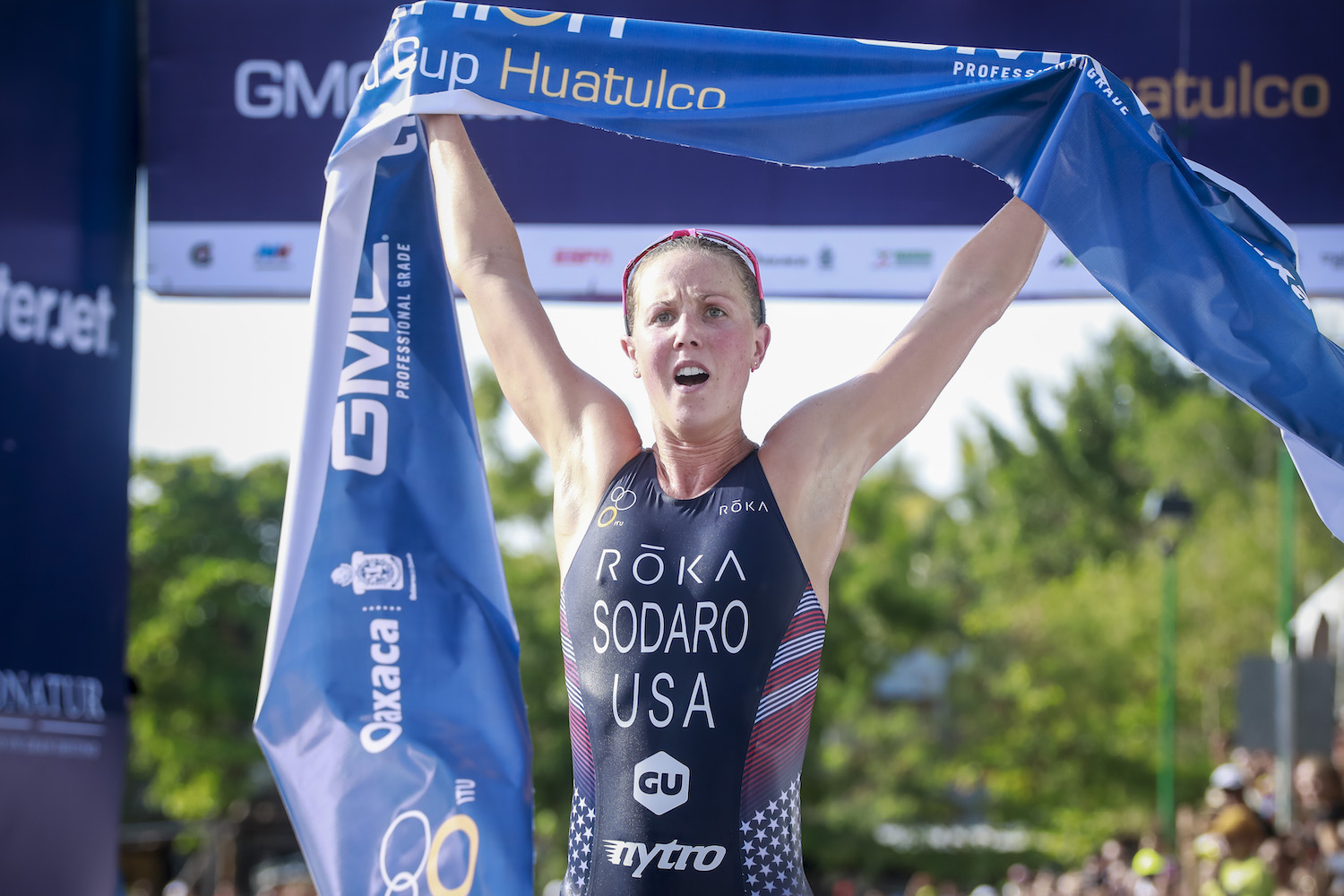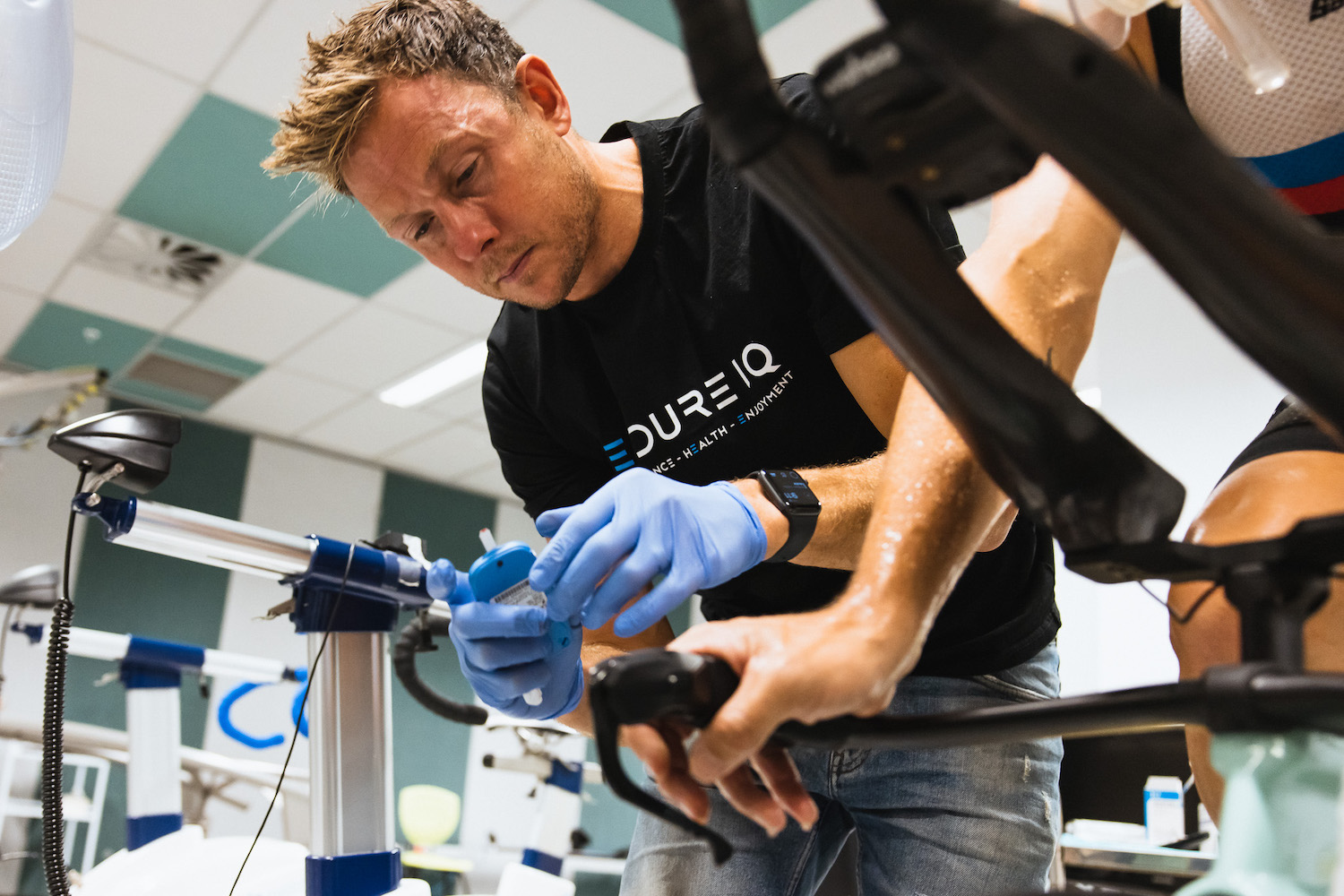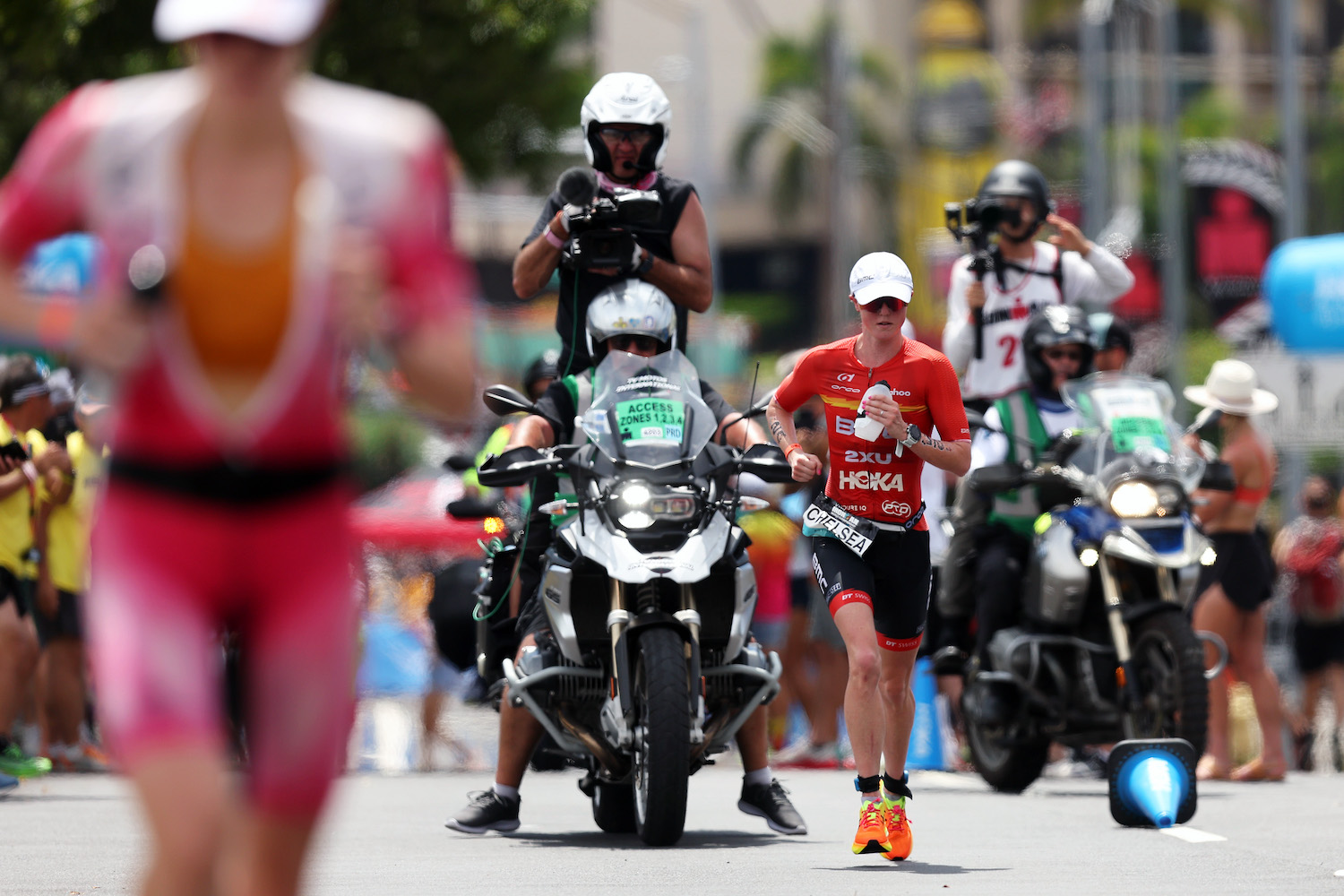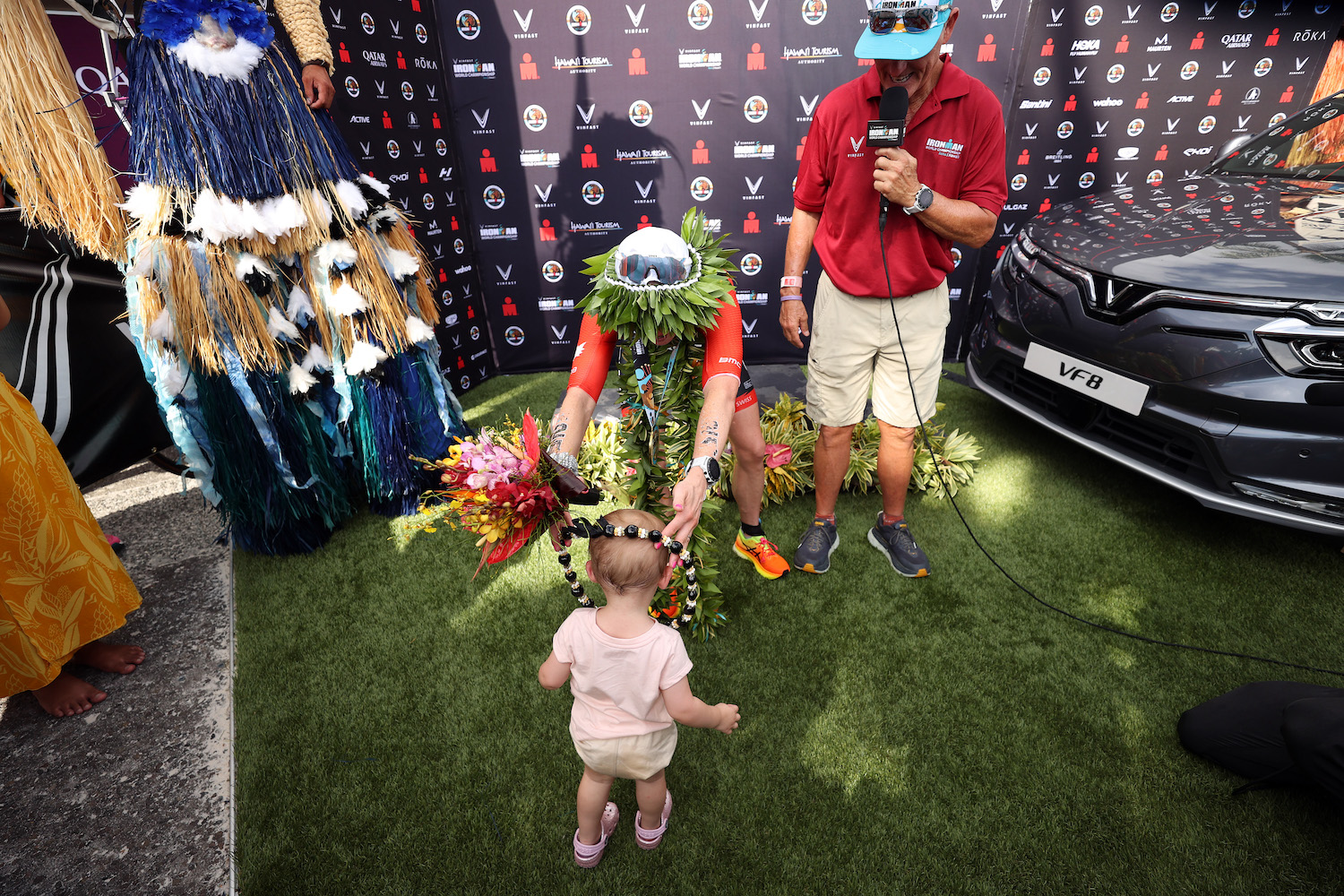Mothers shouldn’t feel lucky for being able to pursue sport, says Chelsea Sodaro
When Chelsea Sodaro took the 2022 Ironman World crown she become only the second mother to win the coveted title. Here, in a 220 exclusive, she shares how she did it, what she hopes her performance inspired and why she won’t stop pushing for further equality…

Chelsea Sodaro was thinking less about her chances of winning Kona and more – as she held baby Skye for the regular two-hour feed – whether she should quit the sport.
“Oh my gosh, there were so many days,” the 33-year-old says, reflecting on last summer from her home in Reno, Nevada. “In the last 18 months I have never questioned myself more often, never wanted to quit my job more often.
“Even five weeks out from Kona, I got the flu with my kid, and just said to my husband Steve: ‘I don’t know if this is what I’m meant to be doing, because it is really hard.’”
How times change. Almost a month on from one of the most momentous Ironman World Championship wins in triathlon’s proud history in Hawaii, Sodaro has become the first US-born woman to win Kona since Karen Smyers in 1995, the first female since Chrissie Wellington in 2007 to take the title on debut, and the first mother since Natascha Badmann in 2005.
What it means for Chelsea and the wider sporting context we’ll come to shortly. What it means for Skye right now, isn’t quite the same.
“People keep asking me if I’m still riding the high. When you have a toddler, you come down from the high really quickly because she just wants her mom, and her milk, and to go to the park.
“The little lady in my house is the centre of our world and it’s been nice to have a bit more time and the opportunity to be really present with her. I’m optimistic about some positive things that will be coming into our lives and my career – that is really exciting. But the foundation of our family life is the main thing.”
I wanted to prove to myself that even though everything had changed I could also be myself and be excellent in pursuing my goals
Guilt-ridden start

Let’s rewind to late April 2021 when New Zealand-based British coach Dan Plews picked up the phone, albeit at Sodaro’s instigation.
Ambitious plans were afoot to represent the USA at the inaugural Collins Cup, a high-profile team competition in Slovakia in August, but Sodaro had to complete a validation race first to prove fitness. It was time to restart training – at just five weeks postpartum.
“I knew I needed to start, but I didn’t put together what training with a newborn would look like,” she says. “At that stage my daughter was having a lot of feeding issues, and even the thought of training was overwhelming.”
The first month was limited to no more than 12 hours of training per week – many of them guilt-ridden due to leaving Skye – as the reality of the expedited return sunk in. It was part self-enforced, but part necessity. Steve was partway through a career change and Chelsea would be the primary breadwinner.
“This is also my career. Even though my sponsors were supportive, a lot of my income was coming from prize money. We would have been okay, but with a new baby you want stability and security too.”
Then there was the personal challenge and excitement to represent her country on a global stage. “As a new parent, a lot of times we want to hold on to what we were before we have kids. I wanted to prove to myself that even though everything had changed I could also be myself and be excellent in pursuing my goals.”
It was also easy to overlook that Sodaro was relatively inexperienced in long-course racing. A former US champion over 10km, the switch to pro triathlon only came in 2017 with just over a year spent on the World Triathlon circuit before calling time after victory in Mexico.
While the move to non-drafting had started spectacularly – the only time Sodaro wasn’t on the podium in seven starts in 2018 and 2019 was a fourth place in the 70.3 Worlds in Nice – how would she fare post pandemic and postpartum?
Chelsea’s path to Kona victory
2012 US 10km road race, Boston – 1st place
“My first national title helped me to believe that I could be a legitimate professional. It was kind of like Kona. It was my first 10km race, but I wasn’t surprised by the performance, and winning is so fun – it opens all these doors for you.”
2018 ITU World Cup, Huatulco, Mexico – 1st place
“It was a highlight in the sense that I accomplished a big goal in tri for the first time. But it was also the catalyst for me to move to long course because I realised that winning wasn’t enough if I wasn’t enjoying the process.”
2019 Ironman 70.3 World Championship, Nice, France – 4th place
“This was the race that opened my eyes to my potential in non-drafting.” After the breakthrough in southern France, Sodaro went on to win in Augusta three weeks later and Buenos Aires in November before rounding out the year with a podium in Indian Wells.
2022 Ironman European Championship, Hamburg, Germany – 2nd place
“I absolutely loved racing the full distance and this race helped me get excited about what I could do if I was properly prepared and had a little more experience.”

The Plews partnership
Plews was instrumental in helping plot the path back to fitness.
“I was six weeks pregnant when I told Dan I wanted us to work together,” she explains. “It hadn’t been in our original discussions and I told him there’d be no hard feelings if he decided it wasn’t for him. But he was so happy and just wanted to know how he could support us.
“It just instilled so much confidence for me in our partnership that knowing above all else he was going to care about me and my family as people, and not just what he could get out of my career.
It gives me chills now even to talk about it, and I think that foundation of trust is why we’ve been so successful together.”
Sodaro credits Plews as part of the core team that includes her parents, Marci and Peter, who have helped with childcare or training camp support, and husband Steve – “a rockstar dad and partner, and my biggest champion”.
As a firefighter, Steve had to trade shifts to be able to travel to Hawaii. On return, he had to work eight 24hr shifts in 11 days to make up for it.

Sixth place at Ironman 70.3 Boulder in August 2021 got the show on the road, and three weeks later Sodaro impressed in Slovakia with the sixth-fastest time of the day to finish second to Team Europe’s Emma Pallant-Browne in her Collins Cup match-up.
But heading into 2022, Sodaro still hadn’t raced an Ironman, and after the first World Championship in Utah in May, still wasn’t on many radars. Discussion over who would win in Hawaii centred on five-time champion Daniela Ryf, the return of Lucy Charles-Barclay after injury or 2019 Hawaii champion Anne Haug.
Sodaro’s BMC Triathlon teammate Kat Matthews was another name in the mix as was Germany’s Laura Phillip, who had laid down a marker in Hamburg with a time just 2secs off Wellington’s iron-distance record of 8:18:20.
Eighteen minutes behind, Sodaro was setting one of the fastest debut Ironman times ever recorded to clinch her Kona spot. Yet as the race returned to the Big Island for the first time in three years, she would fly in largely undetected.
Sodaro’s coach Dan Plews on coaching Chelsea through pregnancy…
DP: “When Chelsea told me she was pregnant, the first thing I did was research what happens to the body – particularly around exercise – and talk to a lot of athletes I knew who had gone through it. It quickly became clear how personal the experience is and how changes in hormones or morning sickness, for example, affect women in different ways.
“As a result, we took an individualised approach to monitoring Chelsea’s fitness, using Heart Rate Variability (HRV) [a means of assessing how recovered an athlete might be], talking often to see how she was feeling, and determining training on a day-to-day basis – which meant not training at all if Chelsea didn’t feel up to it.
“One of the main elements we reduced – particularly towards the latter stages – was the high-intensity stuff. And into the third trimester, she would simply do her own thing as and when she felt able.”
220: It’s been said that increased blood plasma resulting from pregnancy could have a beneficial effect on training. What are your thoughts on this?
DP: “Not training, or limiting your training, will far outweigh any benefits of having an increased blood plasma volume. To my understanding, it does increase by 50%, but 6-8 weeks after giving birth it’s pretty much back to normal – so is not going to be of benefit – and certainly not 18 months later when Chelsea was winning Kona.”

Reaching a new level

“All the people close to me tried to reinforce the idea that there was no external pressure – I was a rookie, new to the distance,” she explains. “But I think my husband and coach thought something really special could happen because they were seeing my training.
“I’m a workaholic and totally obsessed with my job, and in the three-to-four weeks before the race I felt like I was reaching a new level. I didn’t think I could hit the run sessions, but I was nailing every single one.”
The race-week nerves weren’t helped by booking an apartment without air conditioning and then panic booking a room at the Royal Kona hotel on Ali-i Drive to be close to the start – only to fret that she’d be late anyway.
“There were so many people and it was really hard to navigate my way to bodymarking, so I was sweating profusely at 5am, desperate that I wasn’t going to make it!
From that perspective it was a stressful race morning, but as soon as I got into the water I felt this sense of calm.
“I was soaking it in with this beginner’s mindset of not knowing what the day could bring. That’s not unique to me, that goes for the entire field – wanting to find out what we’ll endure.”
What Sodaro would endure turned out to be just about the perfect day.
Handily placed in the second swim pack 4mins behind early leader Charles-Barclay, a 4:42:07 bike split was the day’s third fastest to keep her in contention, before a 2:51:44 marathon – overtaking Charles-Barclay towards the top of the famous Palani hill – earned victory in 8:33:45, a time that would have won every other women’s race in Kona except Ryf’s in 2018.
“I’m not surprised by what I did because I executed the race I trained to do, but never did I add up what it meant. I never did the maths,” Sodaro explains.
“It’s so cheesy but when you’re committed to your own process it’s almost as if it doesn’t really matter.
“I have a lot of reverence for this race and any time my mind would drift to the idea of winning, I brought it back, telling myself to stay present.
“One of my mantras is ‘stay here’. All I can control is what I’m doing at this moment, and you have to take care of yourself – staying cool and hydrated – especially in Kona.
“It wouldn’t matter how big my lead was with 10k to go if I had to start walking.
“It was only when I had about 5-6 more minutes of running and I turned left onto Kuakini Highway that I started to think about my family and my daughter, and just really wanting to see them.”
Any time my mind would drift to the idea of winning, I brought it back. One of my mantras is ‘stay here’. All I can control is what I’m doing at this moment
Championing mothers in sport

While Sodaro is breaking new ground for the sport, she wasn’t the only recent mother to line up on the Big Island.
Britain’s Susie Cheetham gave birth to baby Henry in December 2020 and battled through injury and illness to qualify in Iowa and then make the start-line.
The Bath-based athlete who has twice finished sixth in Hawaii put a “rough 18 months where I came close to quitting” behind her to finish in the prize money in 11th.
Elsewhere in the sport, mothers have also shown what’s possible, and none more so than Nicola Spirig.
The Swiss returned from having a first child in 2013 to win Olympic silver in Rio and then after her third child was back for a fifth Olympic Games in Tokyo last year, where she placed seventh.
Back to Sodaro, though, whose win was historic for many reasons, including being the first time the women’s professional race took centre stage, racing on Thursday with the pro men lining up two days later.
“I think that was probably the best women’s field ever assembled – certainly the deepest,” she says. “But I don’t think the camera would have been on me at all on the bike if the men’s race was happening.
“We deserve to have the media attention and fans of the sport deserve to see the whole race play out. We know how much more exciting the race is when you can actually follow all the storylines and see it developing.”
[Since this feature went to print, Ironman have announced that the men’s and women’s world championship races will be split over two different dates and locations from 2023]
If one of those storylines is to show what’s possible for mothers to take part in sport, then it’s the one Sodaro would like to champion more than any other.

“What means the most to me is when other moms reach out. I’ve had women coming up to me with tears in their eyes saying thank you.
“I don’t feel like I deserve that, but triathlon can be such a selfish pursuit and I come from a family of very altruistic, service-minded people, so it means a lot to feel like I’m making some kind of impact beyond the biking I’m doing in the solitude of my garage!
“Society teaches women and moms that we should be sacrificing everything for our children. We’re taught to feel a lot of guilt when we pursue things outside of our family and a 9-5 job.
“There are more women than I expected who feel like they need permission to pursue their own dreams and own goals in sports.
“My goal is to show what’s possible when you have the right support system in place and that as moms we deserve to have that time to ourselves, and that actually taking time for ourselves and pursuing things that light us up as whole people makes us a better parent.
“I also think a lot about the kind of woman I want Skye to be, and how I want her to see me. I don’t want to be this martyr for our family.
“I want her to feel like she can pursue whatever it is that makes her feel happy and alive and that she can also have a family and kids if that’s what she wants.
“Someone asked me why I’m so proud to have won Kona as a mom. I think it’s moms who understand that. The sacrifice and what it looks like to raise a newborn, infant and toddler while also doing triathlon.
“I wouldn’t talk about maternity or my motherhood journey if I didn’t have to, if I thought things were equitable and that we had equal opportunity.
“I still feel lucky that my sponsors supported me and that we have this maternity leave policy with the Professional Triathletes Organisation.
“These are all incredible initiatives, but I will stop talking about it when we don’t just feel lucky.”
Top image credit: Ezra Shaw/Getty Images for Ironman




